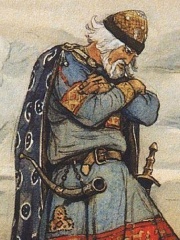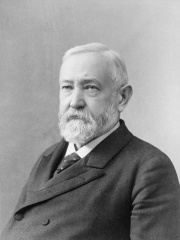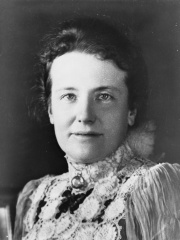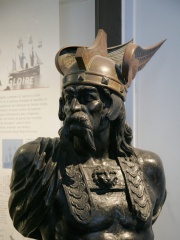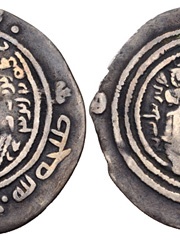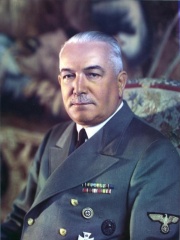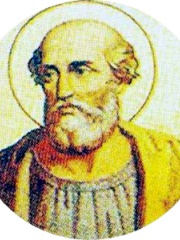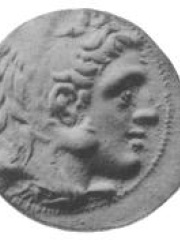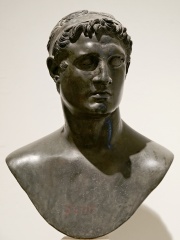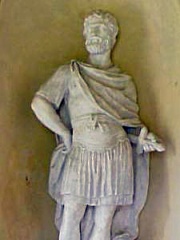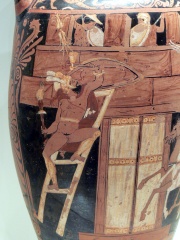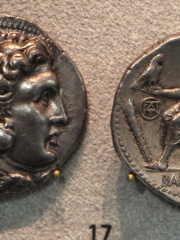سياسي
Peleus
AR.WIKIPEDIA PAGE VIEWS (PV)
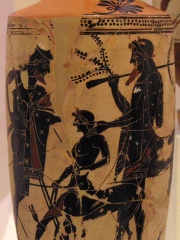
 Peleus
Peleus
سيرته الذاتية متاحة بـ52 لغة مختلفة على ويكيبيديا (زيادة من 49 في 2024). يحتل Peleus المرتبة 1,031 بين أكثر سياسي شعبيةً (تراجعًا من 707 في 2024)، والمرتبة 77 بين أكثر السير الذاتية شعبيةً في اليونان (تراجعًا من 70 في 2019)، كما يحتل المرتبة 23 بين أكثر سياسي من اليونان شعبيةً.
Memorability Metrics
Page views of Peleus by language
Among سياسي
Among سياسي, Peleus ranks 1,031 out of 19,576. Before him are Cleopatra Selene II, Oleg of Novgorod, Benjamin Harrison, Edith Roosevelt, Hezekiah, and Faisal II of Iraq. After him are Brennus, Marwan I, Ludwig I of Bavaria, Henry I of England, Charles VII, Holy Roman Emperor, and Konstantin von Neurath.
Most Popular سياسي in Wikipedia
Go to all RankingsCleopatra Selene II
40 BC - 5
HPI: 75.73
Rank: 1,025
Oleg of Novgorod
900 - 912
HPI: 75.73
Rank: 1,026
Benjamin Harrison
1833 - 1901
HPI: 75.73
Rank: 1,027
Edith Roosevelt
1861 - 1948
HPI: 75.73
Rank: 1,028
Hezekiah
800 BC - 697 BC
HPI: 75.72
Rank: 1,029
Faisal II of Iraq
1935 - 1958
HPI: 75.71
Rank: 1,030
Peleus
HPI: 75.70
Rank: 1,031
Brennus
500 BC - 390 BC
HPI: 75.70
Rank: 1,032
Marwan I
623 - 685
HPI: 75.70
Rank: 1,033
Ludwig I of Bavaria
1786 - 1868
HPI: 75.70
Rank: 1,034
Henry I of England
1068 - 1135
HPI: 75.70
Rank: 1,035
Charles VII, Holy Roman Emperor
1697 - 1745
HPI: 75.69
Rank: 1,036
Konstantin von Neurath
1873 - 1956
HPI: 75.69
Rank: 1,037
In اليونان
Among people born in اليونان, Peleus ranks 77 out of NaN. Before him are Isocrates (-436), Constantine I of Greece (1868), Nana Mouskouri (1934), Lysippos (-390), George II of Greece (1890), and Princess Marina of Greece and Denmark (1906). After him are Clement of Alexandria (150), Pope Hyginus (100), Galla Placidia (388), Paul of Greece (1901), Antigonus I Monophthalmus (-382), and Handan Sultan (1574).
Others born in اليونان
Go to all RankingsIsocrates
PHILOSOPHER
436 BC - 338 BC
HPI: 76.16
Rank: 71
Constantine I of Greece
POLITICIAN
1868 - 1923
HPI: 76.14
Rank: 72
Nana Mouskouri
SINGER
1934 - Present
HPI: 75.87
Rank: 73
Lysippos
SCULPTOR
390 BC - 300 BC
HPI: 75.87
Rank: 74
George II of Greece
POLITICIAN
1890 - 1947
HPI: 75.76
Rank: 75
Princess Marina of Greece and Denmark
NOBLEMAN
1906 - 1968
HPI: 75.71
Rank: 76
Peleus
POLITICIAN
HPI: 75.70
Rank: 77
Clement of Alexandria
PHILOSOPHER
150 - 215
HPI: 75.69
Rank: 78
Pope Hyginus
RELIGIOUS FIGURE
100 - 142
HPI: 75.67
Rank: 79
Galla Placidia
POLITICIAN
388 - 450
HPI: 75.63
Rank: 80
Paul of Greece
POLITICIAN
1901 - 1964
HPI: 75.58
Rank: 81
Antigonus I Monophthalmus
POLITICIAN
382 BC - 301 BC
HPI: 75.43
Rank: 82
Handan Sultan
POLITICIAN
1574 - 1605
HPI: 75.42
Rank: 83
Among سياسي In اليونان
Among سياسي born in اليونان, Peleus ranks 23. Before him are Constantine II of Greece (1940), Ptolemy II Philadelphus (-308), Ptolemy III Euergetes (-284), Epaminondas (-418), Constantine I of Greece (1868), and George II of Greece (1890). After him are Galla Placidia (388), Paul of Greece (1901), Antigonus I Monophthalmus (-382), Handan Sultan (1574), Creon (null), and Philip III of Macedon (-359).
Constantine II of Greece
1940 - 2023
HPI: 77.65
Rank: 17
Ptolemy II Philadelphus
308 BC - 246 BC
HPI: 77.45
Rank: 18
Ptolemy III Euergetes
284 BC - 222 BC
HPI: 77.28
Rank: 19
Epaminondas
418 BC - 362 BC
HPI: 76.62
Rank: 20
Constantine I of Greece
1868 - 1923
HPI: 76.14
Rank: 21
George II of Greece
1890 - 1947
HPI: 75.76
Rank: 22
Peleus
HPI: 75.70
Rank: 23
Galla Placidia
388 - 450
HPI: 75.63
Rank: 24
Paul of Greece
1901 - 1964
HPI: 75.58
Rank: 25
Antigonus I Monophthalmus
382 BC - 301 BC
HPI: 75.43
Rank: 26
Handan Sultan
1574 - 1605
HPI: 75.42
Rank: 27
Creon
HPI: 75.37
Rank: 28
Philip III of Macedon
359 BC - 317 BC
HPI: 74.78
Rank: 29

